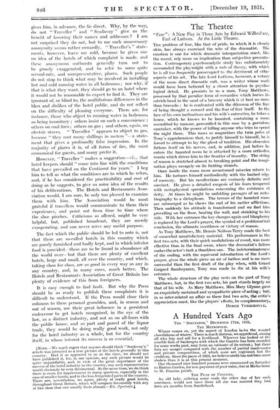The Theatre
"Fear": A New Play in Three Acts by Edward Wilbraham, Earl of Lathom. At the Little Theatre.
Tim problem of fear, like that of pride, to which it is closely akin, has always exercised the wits of the dramatist. The emotion is one for which dramatic interpretation must, like the moral, rely more on implication than subjective presenta- tion. Contemporary psychoanalytic study has unfortunately surrounded the playwright with a web of theory, with which he is all too frequently preoccupied to the detriment of other aspects of his art. The late Lord Lathoni, however, a votary of the more direct dramatic cult, was a writer whose work would have been bettered by a closer attention to psycho- logical detail. He presents to us a man, Tony Matthews, possessed by that peculiar form of cowardice which buries its ostrich-head in the sand of a bravery which is at best no more than bravado : he is confronted with the dilemma of the fear of being thought a coward and the fear of fear itself. In the face of his own inclinations and his wife's entreaties, he takes a house, which he knows to be haunted, containing a room accredited by rumour, personified in this case by a garrulous caretaker, with the power of killing anyone who tries to spend the night there. This room so magnetises the twin poles of Tony's apprehensions that, to justify himself to himself, he is forced to attempt to lay the ghost of tradition. His obsession fattens itself on his nerves, and, in addition, just before he enters the haunted room he is attacked by a more orthodox mania which drives him to the frontier of insanity. The string of reason is stretched almost to breaking point and the imagi- nation plays savagely on its fretting strands.
Once inside the room more accustomed miseries return to him. He tortures himself methodically with the barbed edge of memory. But his recollections are curiously definite and succinct. He gives a detailed exegesis of his fears tempered with metaphysical speculations concerning the existence of deity. At times he might be unfolding passages of an auto- biography to a dietaphone. The terrors of the haunted room are submerged as he chews the cud of his earlier afflictions. Then suddenly his attitude is transformed and we find him grovelling on the floor, beating the wall, and shrieking to his wife. With her entrance the key changes again and blasphemy is replaced by the Lord's prayer, the symbol of a problematical conclusion, the ultimate overthrow or victory of reason.
As Tony Matthews, Mr. Dennis Neilson-Terry made the best of somewhat unsatisfactory material. His performance in the first two acts, with their quick modulations of mood, was more effective than in the final scene, where the dramatist's failure makes the actor's task a thankless one. The indeterminateness of the ending, with the equivocal introduction of the Lord's prayer, gives the whole piece an air of bathos and is no more successful than the first draft of the play when, with Grand Guignol flamboyance, Tony was made to die at his wife's entrance.
The whole structure of the play rests on the part of Tony Matthews, but, in the first two acts, his part stands largely on that of his wife. As Mary Matthews, Miss Mary GIynne gave an exquisitely sustained and sympathetic piece of acting ; but, in so inter-related an affair as these first two acts, the critic's appreciation must, like the players' efforts, be complementary, DEREK VERSCUOYLE.


































 Previous page
Previous page